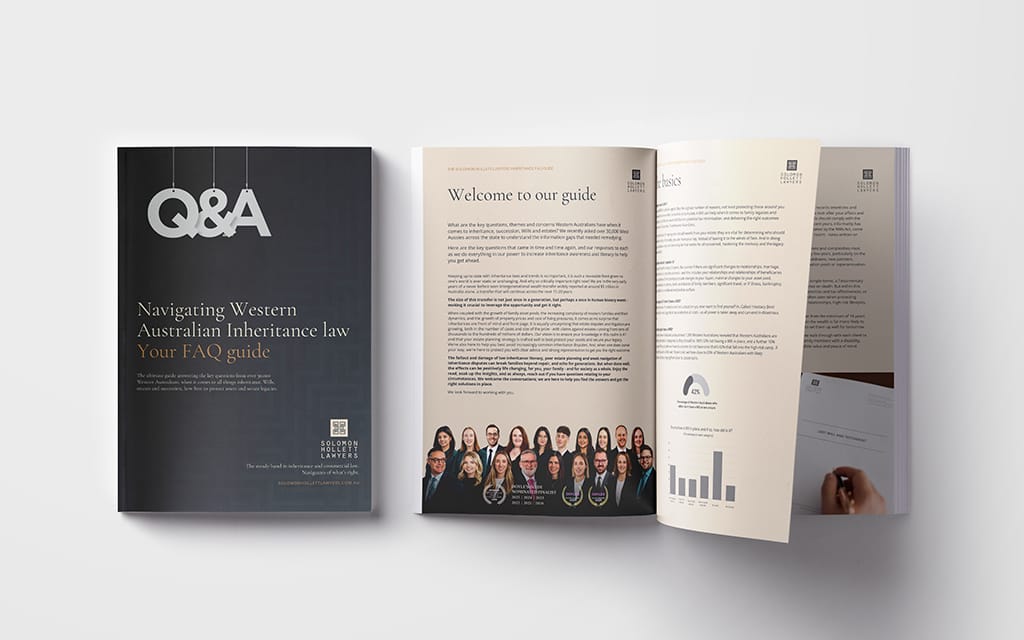
Contesting
a Will
If you’ve been left out of a Will or not properly provided for, you may have the right to contest it. Our Will contest lawyers help you make a Family Provision claim under the Family Provision Act 1972 (WA), guiding you through what can often be an emotional and complex process.
We’ll help you understand your eligibility, assess your position, and act quickly to protect your rights and secure what you’re entitled to
Book a free 15 minute phone callThe Law
Australasia
Pursuit of
Excellence Award
Doyle’s guide
award
2025 | 2024 | 2023
2022 | 2021 | 2020
The Law
Australasia
Pursuit of
Excellence Award
Doyle’s guide
award
2025 | 2024 | 2023
2022 | 2021 | 2020

How we can help you

Contesting a Will can feel daunting, especially when family dynamics and financial pressures are involved. If you’ve been unfairly left out, inadequately provided for, or suspect the Will isn’t valid, we’ll help you take clear, confident steps to make a claim.
You may well also be on the receiving end of a contest with someone looking to challenge a Will you are a beneficiary of. If you’re an Executor or beneficiary needing to defend a Will, we can assist with that too. Visit our Defending a Will page to learn how we can support you.
Here’s what we help with:
- Identify if you’re eligible to contest under the Family Provision Act 1972 (WA)
- Assess your claim and explain your legal rights
- Challenge unfair Wills or inadequate provisions
- Defend a challenge or claim if you are under attack
- Investigate issues such as undue influence or lack of capacity
- Negotiate with other beneficiaries or executors
- Represent you through court proceedings if needed
- Explore early resolution through mediation where appropriate

Hear from our team on how to contest a Will



Need advice on challenging or contesting a Will or defending the challenge or claim? We’re just a phone call away
Our Will contest lawyers are here to help you understand your position, employ the right strategies and take the right course of actionl. Book a free 15-minute consultation to get clear guidance and understand your next steps with confidence


Over 130 5-star reviews
From individuals to families, from startups to large corporates, professional groups to charitable foundations – we’ve stood beside a diverse range of clients helping them best navigate their legal journeys. Here’s what just some of them have to say
“I cannot thank Matthew and Morgan enough for their dedication and support during one of the hardest times of my life. From the very beginning, they were not only incredibly knowledgeable and strategic, but also deeply moral, always upholding integrity while achieving outstanding results. I always felt heard, supported, and confident in their guidance. Their trustworthiness gave me peace of mind, and they were always available when I had questions or concerns. If you need a lawyer who truly cares and fights for you, I highly recommend Solomon Hollett Lawyers.”
Client wishes to remain anonymous
“I cannot recommend Solomon Hollett Lawyers enough. The team were fantastic from start to finish. My elderly mother recently lost my father and there were some delicate matters to finalise. From receptionists to the Partners, my mother was treated with respect, kindness, understanding and given every assistance and courtesy she could want. We were informed every step of the process and they made it 100% stress free. Their fees were more than reasonable, especially as my mother is a pensioner. If you are looking for a firm that truly cares, that you can trust to do what you require, when you require it and within budget look no further than the team at Solomon Hollett Lawyers, they’re fantastic!”
Sheryl
“The last few months have caused a significant amount of stress for me around an estate matter. I wasn’t sure what to expect when I searched for legal assistance since I have never had to use the services of a law firm before. Other Google reviews led me to Solomon Hollett Lawyers where I found Brandon to be very helpful and knowledgeable. Just knowing that he was supporting me in this matter made all the difference and helped to facilitate a positive outcome.”
Vicki
“From our first interaction, I knew Andrew Bower was the right lawyer for my property dispute case. His extensive knowledge and clear communication transformed what seemed like a complex issue into something manageable and understandable, giving me the confidence to move forward. Throughout the entire process, Andrew was consistently diligent, attentive, respectful, and compassionate. I always felt heard and supported every step of the way. He made time to address my concerns and provided reassurance that greatly eased my mind. Not only did he handle the legal complexities with professionalism, but he also alleviated the emotional stress that came with it. Andrew was a true blessing in my corner, fighting for me with unwavering dedication. The favourable outcome was a direct result of his expertise and commitment. I truly believe that not all lawyers are created equal—Andrew stands head and shoulders above the rest. His blend of legal brilliance, compassion, and relentless dedication makes him an exceptional lawyer. I’m beyond grateful for his service and support, and I would wholeheartedly recommend him without any hesitation.”
Thao
“Great experience dealing with the team from Solomon Hollett hired to represent me in a contested estate Will in which I was the executor. Best described as down to earth interactions with good comms and professionalism maintained throughout, a positive result was achieved and I have no hesitation in recommending the team.”
Thomas
“Almost two years after winding up my business I received an erroneous letter of demand for close to $200k from a Global supplier which came with a lien on my home. I engaged Andrew from Solomon Hollett based on a recommendation and from the outset I have been nothing but impressed. The communication from Andrew and his team has been prompt and concise. Unfazed by the unlimited resources and size of the plaintiff Andrew was able to negotiate a settlement of less than 5% and obviously have the lien on my home removed. Should you find yourself in need of legal services I have no hesitation in recommending Andrew and his team.”
David
“I have engaged the legal services of Solomon Hollett on a couple of occasions. They have always been professional and have obtained the best outcome possible in every situation. They also treat each matter with care and consideration for their clients. I can highly recommend them.”
Heather
“We had a great experience with Brandon from Solomon Hollett. From the first phone call, I could tell that he had a solid grasp of our situation and what we wanted to achieve. He was very helpful and very responsive throughout our dealings with him. He got everything done in a timely way and we’re very happy with the result. Definitely recommended! Thanks, Brandon :)”
AJ
“We are very grateful to Craig for his outstanding work. Craig was highly professional, clear about his role and what he could do for us and he handled our case with an incisive precision. Craig fully and respectfully explained the processes and complexities of the case in a language that made sense to us, and he outlined in detail steps that we had to take. What impressed us most was his willingness to understand the complexities of our Church structures and laws and take on board our principles and concerns. We cannot recommend Craig highly enough.”
Jaine
“Matthew Gunn was highly recommended to my wife and I. We both needed to renew our old out-dated Wills. We found Matthew to offer very good advice, he also is a good listener and once he gathered the details and our wishes he then gave valuable legal suggestions to ensure we had new Wills that suited our complex needs. Our new detailed legal Wills are exactly the way we wanted it. We can now rest easy knowing that should something happen to one or both of us, our Wills will ensure our investments and wishes are managed the way we requested. If you need legal advice or Wills drawn up, I would recommend you make an appointment to see Matthew Gunn.”
Paul
“I had an exceptional experience with Solomon Hollett Lawyers, particularly thanks to Annabel and Brandon. Annabel was my primary contact throughout my family provisions claim, and her professionalism and honesty made a significant difference. She was always open and transparent, ensuring I understood each step of the process. Brandon, as the director, provided valuable insights and guidance that further reinforced my trust in their team. Both of them set realistic expectations, which helped me navigate a challenging situation with confidence. I truly felt supported and informed every step of the way. I highly recommend Solomon Hollett Lawyers for anyone needing expert legal assistance!”
Alanah and Jarrad
“We engaged Solomon Hollett to represent us (executors) in a challenging and frustrating estate matter. We cannot praise both Morgan Solomon and Matthew Gunn highly enough for the extremely professional and understanding approach they took and their attention to detail. Their knowledge of both the law and estate procedures was second to none and their communication skills were outstanding. We settled the matter at mediation thanks in large part to their support and guidance. I would very strongly recommend them.”
Ian and Alan
“Many thanks to Brandon Hetherington who helped us with a recent property transaction matter and achieved a favourable outcome. Brandon was referred to us by an interstate law firm as a matter of urgency. We were and are immensely grateful that he was exceptionally professional, efficient, knowledgeable, informative, experienced, responsive and respectful in assisting us. His advice gave us extra confidence in dealing with the matter and we were fully satisfied with the results. We cannot thank Brandon enough. We give 10 out of 5 stars for Brandon, and highly recommend his services and Solomon Hollett Lawyers.”
LF
“Morgan is absolutely outstanding. Thorough, considerate and clearly communicates, but also works with compassion. He was so reassuring and helpful we couldn’t believe that treatment from a lawyer. Cannot speak highly enough of him and the work they do.”
Kristen
“What an amazing team of professionals who are also caring, contactable, approachable. Thank you so much.”
Peter
“I am forever grateful to have found Matthew Gunn (of Solomon Hollett Lawyers) to handle my complex family estate matter. I organised a free telephone consult from interstate with Matthew (because of positive online reviews), and I am so pleased that I did. From the outset, Matthew’s empathy, estate legal knowledge and confidence in my case was reassuring and a great relief. I was not only impressed with Matthew’s knowledge of estate law but also his kindness and unwavering persistence to fight for me.
My case was complex (it was drawn out for approximately 18 months) and whilst Matthew was my main contact, I also had the pleasure to work with Jessica Spee. I felt very supported by both Matthew and Jessica and impressed with their high level of professionalism, respect and compassion. This professionalism also carried through to support staff. I wholeheartedly recommend Solomon Hollett Lawyers and thank Matthew and Jessica for their work to settle my case favourably, so that I can move forward with my life.”
Client wishes to remain anonymous
“We are very grateful for the professionalism and knowledge of both Matthew and Morgan who helped us to deal with a very difficult family estate matter.
Throughout the process they clearly outlined all the options available for us and helped us to work through the best option for us.
They helped us to remain focused on the main issues at hand when we were up against some very frustrating and stressful matters.
In addition the ability to hold meetings via teleconference due to living over 2 hours away made the process even easier.
We would definitely recommend Solomon Hollett Lawyers to anyone that is having issues with Estate Matters.”
Client wishes to remain anonymous
Our other inheritance
dispute services
Inheritance disputes
Disputes over deceased estates can strain families and create lasting conflict. We help resolve issues such as contested Wills, unclear estate documents, and blended family complications. Our goal is to protect relationships and reduce disruption while securing a fair outcome

Defending a Will
If you’re an Executor or beneficiary defending a Will, the responsibility can be overwhelming. We help you uphold the deceased’s wishes, respond to legal claims, and manage Supreme Court proceedings when needed

Estate litigation
When a dispute over a Will, trust, or estate arises, clear advice and strong representation make all the difference. Our estate litigation lawyers help you navigate complex legal issues, protect your interests, and reach resolutions through negotiation, mediation, or the Supreme Court of Western Australia

Discover the Solomon Hollett difference
Personalised legal solutions
We understand the complexities you’re facing. Your litigation needs are unique and nuanced, so we tailor our legal strategies to align perfectly with your specific circumstances, guiding you with precision and dedication every step of the way.
Comprehensive legal knowledge
Rest assured that you’re in capable and experienced hands. Our extensive expertise across diverse legal arenas ensures that we’re equipped to guide you through the most pressing litigation challenges and opportunities, from commercial law and contract disputes to partnership conflicts and beyond
Client-centric approach
Your peace of mind matters to us. We prioritise clear communication and steadfast support, focusing on securing outcomes that restore your calm and confidence.
Proven track record
Count on us to stand by you. Renowned for our commitment to excellence and a legacy of success in commercial litigation, we’re here to protect your interests with proven strategies that work
Accessible and timely legal services
We’re here when you need us. With responsive service and flexible scheduling, we ensure that you receive legal guidance promptly, accommodating your needs and easing your stress during critical times
Transparent and up-front
We’re upfront about the cost of what we do, so you know what you are committing to. We focus on the proportion of the fees to the value of the matter, making the return on your investment easy to ascertain from the get-go.
Get your copy of the Inheritance Law FAQ Guide
Unlock valuable insights into succession law, Wills, estates, and inheritance disputes in WA.

Navigating Western Australian inheritance law – your FAQ guide
The ultimate guide answering the key legal questions from over 30,000 Western Australians when it comes to all things inheritance, Wills, estates and succession. How best to protect assets and secure legacies is covered here as we navigate you through the most common questions, the greatest myths and the biggest mistakes we see time and time again.


Frequently asked questions
On what grounds can I contest a Will?
Who can legally contest a Will?
What’s the difference between contesting and challenging a Will?
What’s the process for contesting a Will in WA?
What evidence is typically required to contest a Will?
How long do I have to contest a Will in WA?
Can I contest a Will without going to court?
What are the risks of contesting a Will?
Do I need a lawyer to contest a Will?
How can I avoid my Will being challenged?
Can my Will be watertight?



Book your free 15 minute phone call

If you believe you’ve been unfairly left out of a Will or have concerns about how an estate is being distributed, our Will contest lawyers can help. In a free 15-minute call, we’ll listen to your situation, explain your legal options, and help you decide on your next steps.
Contact us
Postal Address
PO BOX 840, West Perth,
Western Australia 6872
Phone
08 6244 0985





